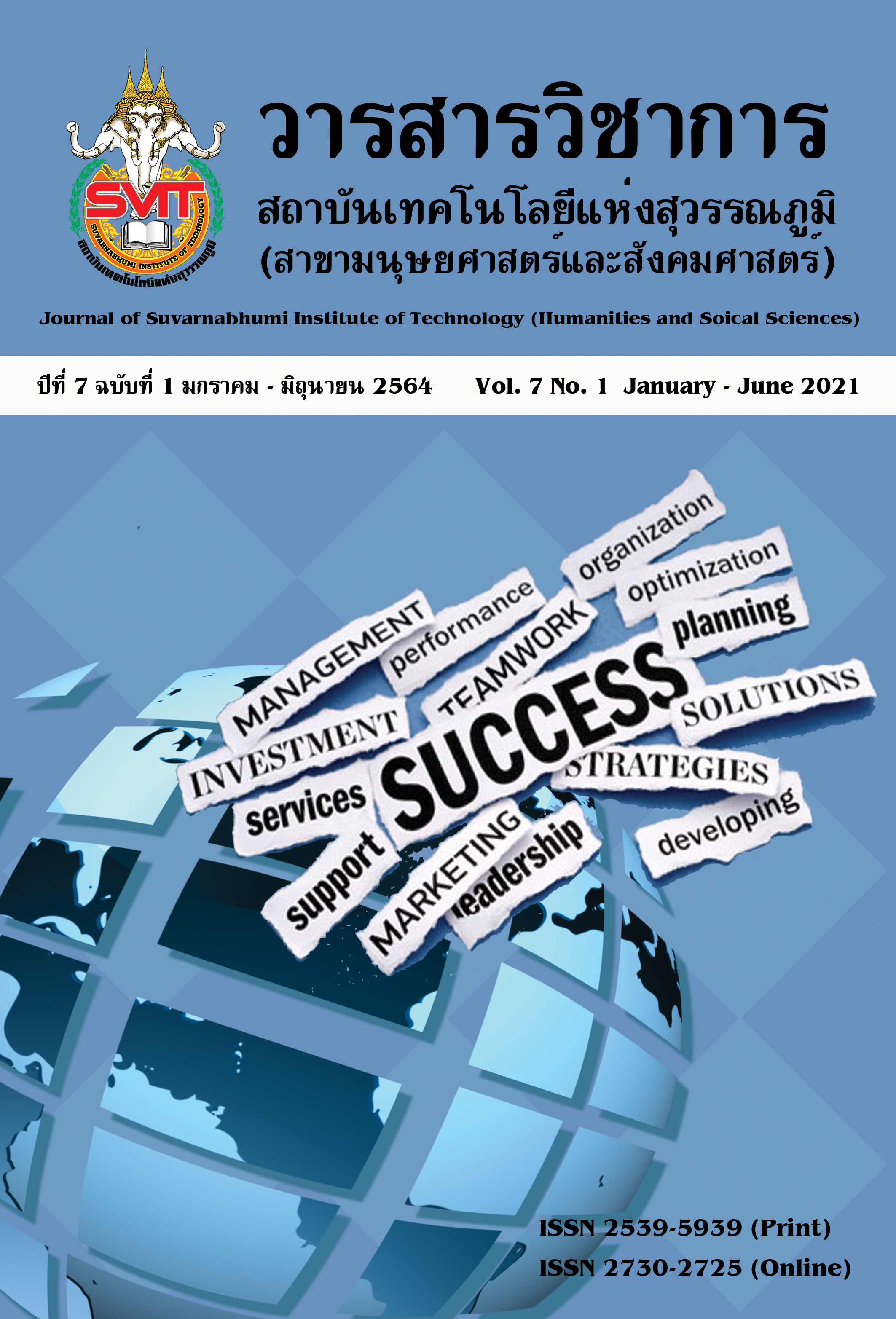THE INFLUENCE OF STRUCTURAL CAPITAL AND ENTREPRENUERSHIP IN TRANSFERRING THE RELATIONAL CAPITAL TOWARDS THE PERFORMANCE OF SMALL AND MEDIUM ENTERPRISES INNORTHERN REGION OF THAILAND
Keywords:
Structural Capital, Entrepreneurship, Relational CapitalAbstract
This research aimed to study the influence of structural capital and entrepreneurship on the relational capital transfer to the performance of Small and Medium Enterprises in Northern Thailand. Total population and samples were 400 entrepreneurs who participated in the project of the Productivity Improvement Loan of the Small and Medium Enterprise Development Bank of Thailand from random sampling by using purposive sampling method. As the information in the business is important, then it requires the entrepreneurs to voluntarily participate in the project by using a questionnaire as a tool to collect data, data analysis with the descriptive statistics, and multivariate statistical analysis by using the confirmatory factor analysis (CFA) in order to prove and check the suitability and accuracy of the components of relational capital, structural capital, entrepreneurship, and the business performance. The results showed that Small and Medium Enterprises in Northern Thailand in overall was at a high level. When considered each aspect, it found out that all aspects were at a high level, which the highest one was the business performance aspect, followed by the entrepreneurship aspect then the relational capital aspect and structural capital aspect that shared the same mean respectively. In addition, the results also showed the overall model fit measure that had the proportion of the chi-square value/ number of degrees of freedom (CMIN/DF) was equal to 0.00, which passed the criteria (<3). For the group index that had the value of GFI as 1.00 and the value of NFI as 1.00, also passed the overall model fit measure. It can be summarized the model of structural capital (SC) and the entrepreneurship (EN) in the relational capital (RC) on the performance (PM) of Small and Medium Enterprises in Thailand. Moreover, the research results showed that the structural capital and entrepreneurship on the relational capital transfer is important to Small and Medium Enterprises because it had a positive influence on the performance of Small and Medium Enterprises, which will cause Small and Medium Enterprises to have more performance results in the future.
References
Abdullah, A. S. & Mahmood, R. (2012). Total quality management, entrepreneurial orientation and organization performance: The role of organizational culture. African Journal of Business Management, 6(1), 4717-4427.
Arbuckle, J. L. (2014). Amos (Version 23.0) [Computer Program]. Chicago: IBM SPSS.
Behram, N. K. & Ozdemirci, A. (2014). The empirical link between environmental conditions, organization culture, corporate entrepreneurship and performance: The mediating role of corporate entrepreneurship. International Journal of Business and Social Science, 5(2), 264-276.
Boonyoo, T., Rugruangwuddikri, N., Piriyakul, M. & Khantanapha, N. (2016). Serial mediated effects of intellectual capital and entrepreneurship in transmitting organizational culture to performance of Bus Body Industry. Doctor of Philosophy in Social Sciences Association Ramkhamhaeng University, 6(1), 78-94.
Gurbuz, G. & Aykol, S. (2009). Entrepreneurial management, entrepreneurial orientation and Tukish small firm growth. Management Research News, 32(4), 321-336.
Likert, Rensis. (1967). The Method of Constructing and Attitude Scale, Reading in Attitude Theory and Measurement (pp. 90-95). Fishbeic, Matin, Ed. New York : Wiley & Son.
Mehdivand, M., Zali M. R., Madhoshi, M. & Kordnaeij, A. (2012). Intellectual capital and nano-business performance: The Moderating role of entrepreneurial orientation. European Journal of Economics, Finanse and Administrative Sciences, 52, 147-162.
Ngah, R. & lbrahim, A. (2009). The relationship of intellectual capitral, innovation and organiza tional performance: A preliminary study in Malaysian SMEs. International Journal of Management Innovation systems, 1(1), 1-13.
Pratono, A. H. & Mahmood, R. (2014). The moderating effect of environmental turbulence in the relationship between entreprenrurial management and firm performanece. Universal Journal of Management, 2(7), 285-292.
Rafiei. M., FFeyzi, T & Azimi, H (2011). Intellectual capital and its effect in economic performance: A case study in Iranian automotive industry. Journal of American Science, 7(6), 495-507.
Ratthanan Pongwiritthon, Chanchai Bunchapattanasakda, eld. (2017). Model of Characteristics of Excellence Organization that Influencing the Performance of Small and Medium Enterprise in Northern Region of Thailand. Feu Academic Review, 11(2), 224-239.
Sofian, S., Tayles, M. E. & Pike, R.H. (2004). Intellectual capital: An evolutionary change in management accouting practices practices. Retrieved on March 14, 2018, from http://www. brad.ac.uk/acad//management.
Tahooneh, S & Shatalebi, B. (2012). The relationship between intellectual and organizational creativity among faculty members of Islamic Azad Unversity, Khorasgan Branch in 2011-2012. Life Science Journal, 9(4), 5626-5632.
Talebi, K. & Bahamir, A. (2012). Identification of intellectual capital effects on promoting organization entrepreneurship. International Journal of Business economics & Management Resesrch 2(6), 37-48.
Thanyanan Boonyoo. (2018). Mediated Effects of Structural Capital and Entrepreneurship in Transmitting Relational Capital to the Productivity for Thailand’s Gem and Jewelry Industry. Panyapiwat Journal, 10(1), 41-53.
The Office of SMEs Promotion. (2017). The Small and Medium-sized Enterprises situation report of year 2016 and the trends of year 2017. Bangkok: The Office of SMEs Promotion.
Wang, G. L. (2012). A study of how the organizational culture of international tourist hotels affects organizational performance: Using intellectual capital as the mediating variable. The Journal of Global Business Management, 8(1), 189-201.
Downloads
Published
Issue
Section
License
The articles published are copyrighted by the Sarasas Journal of Humanities and Social Science. The opinions expressed in each article in this academic journal are those of the individual authors and do not reflect the views of Sarasas Suvarnabhumi Institute of Technology. The authors are solely responsible for all aspects of their respective articles. Any errors or inaccuracies in the articles are the sole responsibility of the authors.



